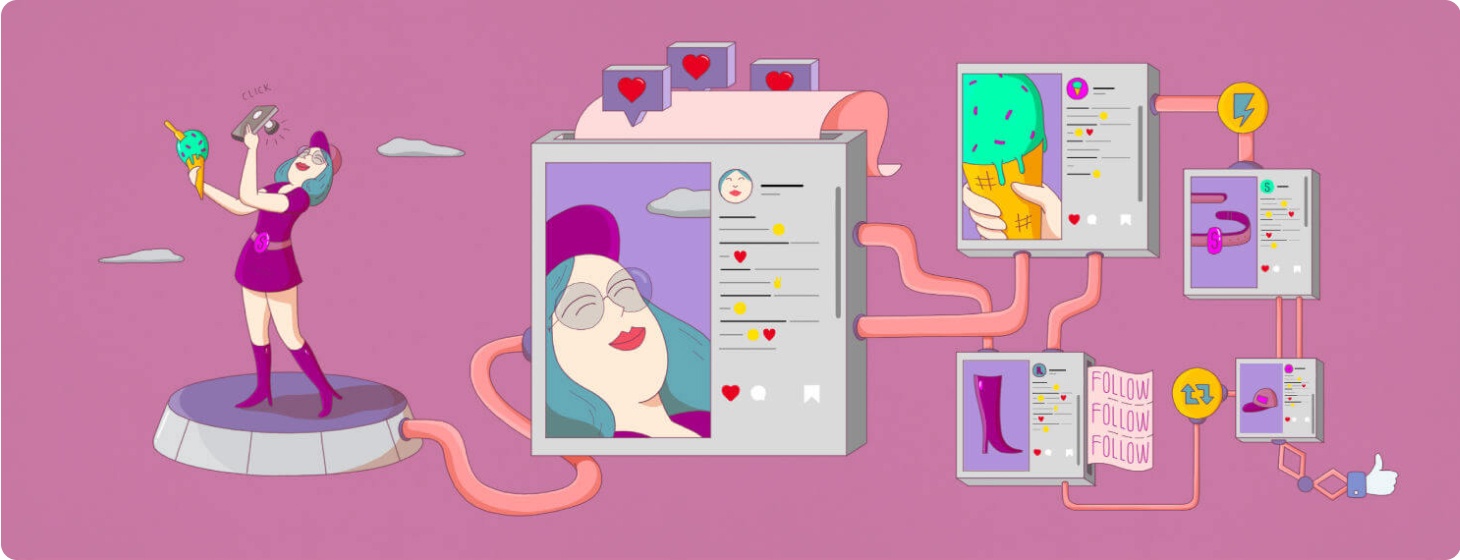
User-Generated Content is simply content created by users that brands can leverage to connect with their target audience and boost conversions. From satisfied consumers and UGC creators to influencers and brand ambassadors, the content that others generate about your brand can be a powerful trust builder.
In this guide, you’ll find everything you need to know about managing and maximising user-generated content. Feel free to explore the entire guide or jump straight to the sections that interest you.
User-Generated Content, often simply called UGC, is all content (such as photos, videos, reviews, testimonials, social media posts, or a mix of all those content types) created by users external to the brand, about a brand, product or service.
When customers share their positive experiences, it not only feels great for your brand, it also spreads the word to potential buyers. In fact, research shows that 82% of consumers are more likely to purchase from a brand that features UGC.
More impressively, our user-generated content statistics show that UGC photos are 5x more likely to convert compared to professional content.
These benefits make user-generated content a must-have for eCommerce stores and any brand aiming to build trust, amplify authentic voices, and ultimately, increase conversions.
Integrating UGC into your marketing strategy can:
For more insights on what user-generated content can help you achieve, check out our in-depth guide: User-Generated Content: Why Integrate It?
UGC has emerged as a critical element in modern marketing strategies. Its importance lies in its ability to:
In short, UGC transforms passive marketing messages into interactive, community-driven content that bridges the gap between your brand and its customers.
Traditional marketing relies on content created in-house or by advertising agencies—polished, professional, and often aspirational. UGC, on the other hand, is the organic output of your customers. Here’s why UGC stands apart:
For more on how to embed an Instagram feed, check out our related articles.
User-generated content isn’t just a marketing trend—it’s a proven strategy that helps brands build trust, engage their audience, and drive sales. The benefits of user-generated content far outweigh any potential downsides, making it one of the most effective tools for modern eCommerce brands.
Consumers today are bombarded with advertisements, making them more skeptical of traditional marketing messages. UGC offers something different: authenticity. When potential customers see real people—people just like them—using and endorsing a product, it builds credibility in a way that branded content simply can’t match.
The power of UGC goes beyond just product reviews. Social proof—seeing others engage with a brand—creates a ripple effect. When people notice their peers posting about a product, they’re more likely to consider it themselves. This organic endorsement can be more persuasive than any advertisement, helping brands break through the noise of digital marketing.
Instead of spending time and resources on professional photo shoots and video production, brands can leverage the endless stream of customer-generated photos, videos, and testimonials already being shared online. This approach is faster, more cost-effective, and often more engaging. By working with Flowbox, The Guggenheim Bilbao generate an average of 1,235 user-generated photos and videos each month.

Not only does curating UGC save time, but it also ensures that the content is naturally relevant to your audience.
Marketing has shifted from being brand-centric to customer-centric. Consumers expect brands to engage with them in a way that feels personal and interactive, rather than simply broadcasting messages. UGC is one of the most customer-focused forms of marketing because it directly involves the audience in shaping the brand’s story.
When people see others engaging with a brand in a meaningful way, it strengthens the emotional connection. UGC fosters a shared brand experience, making customers feel like they are part of something bigger. This community-driven approach not only boosts engagement but also increases customer loyalty.
One of the biggest advantages of user-generated content is its cost efficiency. While traditional marketing efforts often require expensive ad campaigns, professional photo shoots, and influencer partnerships, UGC is largely free to collect and use. Even when brands invest in paid UGC collaborations, the cost is still significantly lower than traditional content production.
The benefits of User-Generated Content are undeniable. From building trust and community to saving time and increasing ROI, UGC is a must-have for any brand looking to grow in the digital age.
User-generated content isn’t limited to social media posts on Instagram or Facebook. It spans across various formats—from YouTube tutorials and customer testimonials to star ratings and blog posts. Every time a customer shares their experience with your brand, whether through visuals, text, or videos, it’s a powerful form of marketing that can boost trust and drive sales.
But are you leveraging all the UGC available to you? Here’s a breakdown of the different types of UGC and how they can enhance your eCommerce strategy.
Social media platforms like Instagram, Facebook, TikTok, and Pinterest are gold mines for UGC. With 95 million photos and videos uploaded daily on Instagram alone, brands have endless opportunities to tap into authentic customer content.
When customers tag your brand or use your hashtag, they’re giving you free, high-quality marketing material. By collecting and integrating this content into your website, product pages, or ads, you create social proof that influences purchase decisions.
Brands like CLUSE effectively use UGC galleries on their eCommerce sites, allowing customers to shop directly from real-life product photos shared by other users. Thanks to this partnership with Flowbox, CLUSE realised a 19% increase in overall conversion rate. This “visual commerce” approach bridges the gap between inspiration and purchase, making the shopping experience more engaging and trustworthy.

Short-form UGC video reviews for footwear companies like ALOHAS can be very beneficial as UGC videos can do a much better job at showing the true style of a shoe compared to a static website image.

This product review by @sarammacholz serves as a great example of product reviews. By receiving tagged UGC videos like this, ALOHAS get an authentic customer voice for their marketing at a fraction of the cost of any traditional brand-made marketing.
Flowbox enables you to gather public videos straight from TikTok, allowing you to tap into one of the richest sources of user-generated content available. Unlock TikTok UGC Gold with Flowbox here.
Before making a purchase, around 7 in 10 consumers state that consumer reviews at least “frequently” influence their purchase decisions. Why? Because customer feedback is one of the most credible sources of information—it’s coming directly from real buyers with first-hand experience.
7 in 10 consumers state consumer reviews at least frequently influence their purchase decisions.
Customer reviews were the original form of UGC, dating back to in-store shopping when word-of-mouth was king. Now, in the digital era, they remain a critical factor in purchase decisions.
Brands can leverage reviews in multiple ways:
Flowbox specialises in the collection and curation of visual forms of user-generated content and in offering top Ratings and Reviews solutions that allow brands to manage review and star rating requests and collection, as well as moderation, analysis, and distribution.

Need help collecting more customer reviews? Read our guide on how to ask for a review.
UGC video content is one of the most powerful and engaging forms of UGC. Platforms like YouTube, TikTok, and Instagram Reels are filled with product tutorials, unboxing videos, and in-depth reviews—many of which are created organically by customers.
YouTube is the most used platform for long-form content. YouTube users consume over 1 billion hours of videos daily. What makes YouTube UGC so effective?
Brands that collaborate with YouTube creators or curate organic UGC from the platform can build stronger relationships with their audience while boosting credibility.
This video for Holdit, a mobile phone accessories company is a great example of showing the usability and features of their phone cases.
These videos help to build anticipation and showcase product presentations while offering authentic first impressions that potential customers find valuable when making purchase decisions.
Every mention of your brand, no matter the format is UGC and can be transformed into a user-generated content marketing strategy.
UGC comes in many forms—from social media visuals and reviews to long-form video content—and each type plays a crucial role in building trust and driving conversions. By strategically collecting, curating, and integrating UGC into your marketing strategy, you can create a more authentic and engaging brand experience.
Check out how these brands implement their user-generated content across different touchpoints in the customer journey. There are many different ways to show UGC with Flowbox: Homepages, Community pages, emails and many more. These examples show how to create a quality UGC social media strategy:
| Brand | Industry | Results |
|---|---|---|
| Andrew Martin | Furniture | High-quality UGC submissions with their awards system. 49% increase in uplift in 1 year. |
| XXL Nutrition | Health, Wellness & Fitness | Average Order Value Uplift of 87.98%. Cost saving by using UGC as product images instead of professional shoots. |
| KICKS | Cosmetics | Implemented on Product Pages and email newsletters. Resulted in a 41.57% average size uplift. |
| Gioseppo | Apparel and Fashion | A/B testing on their homepage showed that with UGC they received a 10.4% increase in sales. |
| Visit Zuid-Limberg | Leisure, Travel and Tourism | UGC implemented on email newsletters. Residents and tourists encouraged to tag them. These organic images resulted in 8% increase in click through rates. |
| CREATE | Consumer Goods | UGC galleries and carousels implemented to showcase and encourage content. In 6 months they approved over 350 ‘high quality submissions’ |
| Scicon Sports | Sporting Goods | UGC on their product pages to show real-life use of products. 3x conversion rate with UGC. Benefitted from the Flowbox rights request process. |
User-generated content’s versatility makes it valuable across multiple marketing channels. With platforms like Flowbox, you can seamlessly integrate UGC throughout your marketing ecosystem for maximum impact.
User-generated content can be integrated strategically across key website sections, including homepages, dedicated community pages, product detail pages, and category listing pages, to build trust and authenticity throughout the customer journey.
Check this example of the popular cosmetics brand MiiN implementing user-generated content on their product pages.
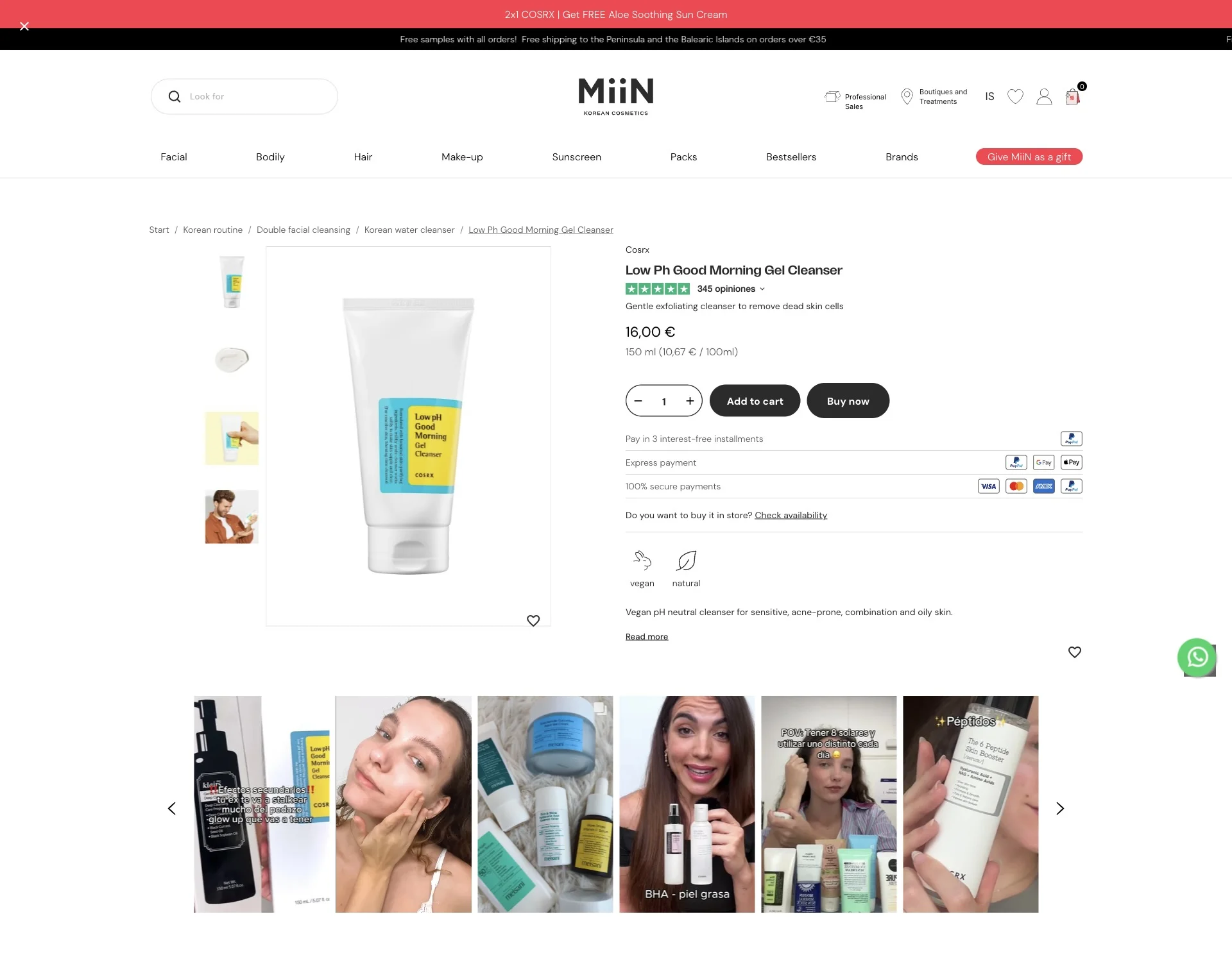
Product pages are crucial touchpoints where purchase decisions are made. The strategic integration of user-generated content on these pages transforms standard product listings into powerful social proof showcases that drive customer confidence and conversions.
Furniture company ScS showcase user-generated content on the homepage of their website:

Evidence demonstrates significant decreases in bounce rates after implementing a UGC strategy. ScS reported that users who interacted with UGC converted more by x4.1 after implementing a UGC strategy on their homepage.
By implementing UGC on their community page, Kids Brand Store got increased conversion and engagement rates:

Kids Brand Store demonstrated an 18% increase in conversion rates and a 23% increase in post engagements after implementing a UGC strategy with Flowbox. When properly implemented, Community pages create a self-sustaining ecosystem of engagement, social proof, and conversion optimisation.
Brands like Nunu-Nana have created a wedding category which shows off all of their customers’ UGC to promote their wedding products and inspire potential future customers.

Targeted UGC helps customers make informed decisions by showcasing products in real-world applications.
User-generated content transforms standard email campaigns into engaging, trust-building tools. UGC on an email can really enhance social proof for a brand and its’ products.
For Holdit, an email marketing strategy using UGC allows them to activate their audience. By promoting branded hashtag participation on their newsletters, there are clear calls-to-action encouraging customers to share their own experiences using your branded hashtags.
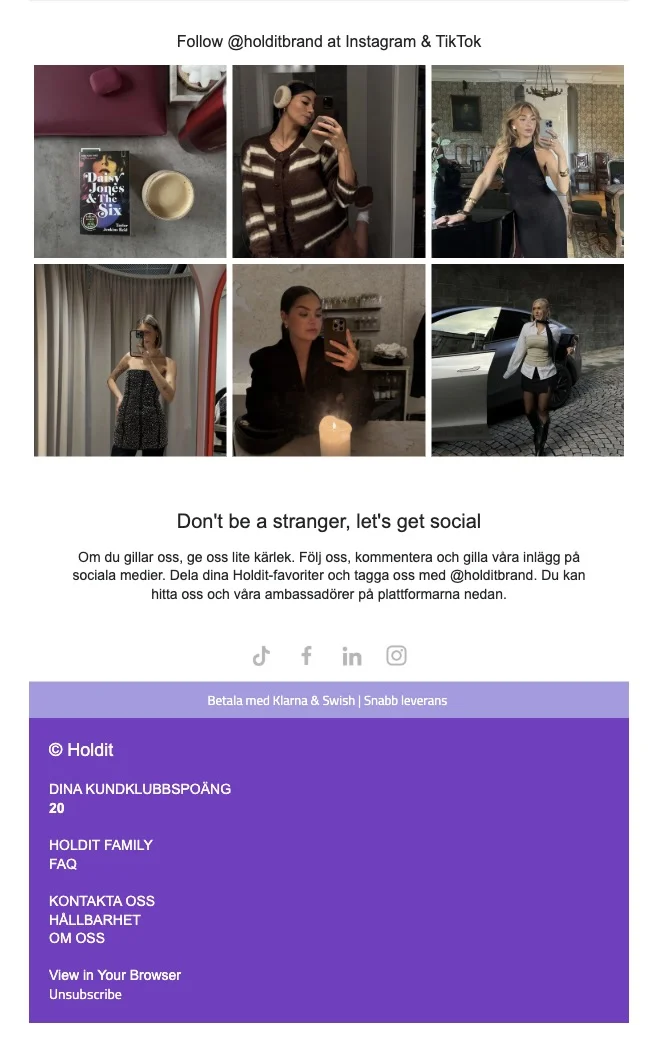
Moreover, it enables subscribers to interact with authentic content – customers can browse, click through, and engage with real user experiences directly from their inbox
Post-purchase emails present a valuable opportunity to strengthen customer relationships while delivering essential transaction information.
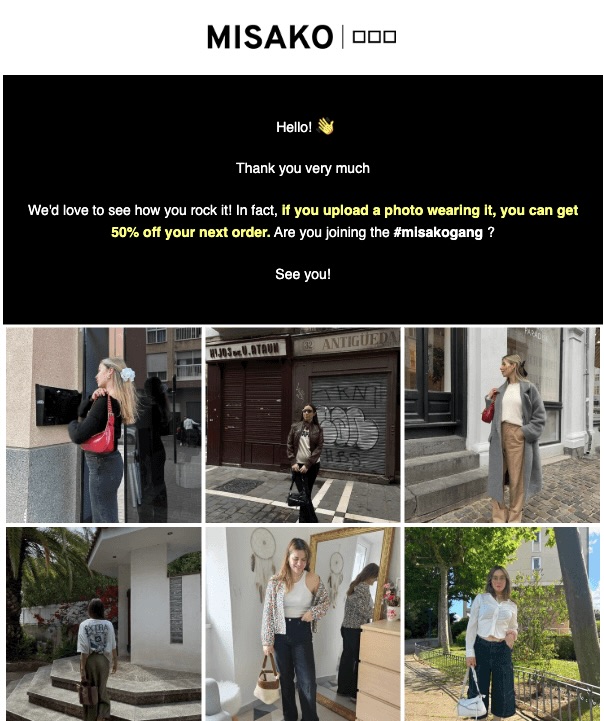
By showcasing real customer experiences on their post-purchase emails, brands like Misako are able to build trust. By addressing the lack of physical interaction, they help customers visualise products in real-world use
Abandoned cart emails can be a really effective place to implement UGC, as it can convince the customer to buy a product when they see a real-world use.
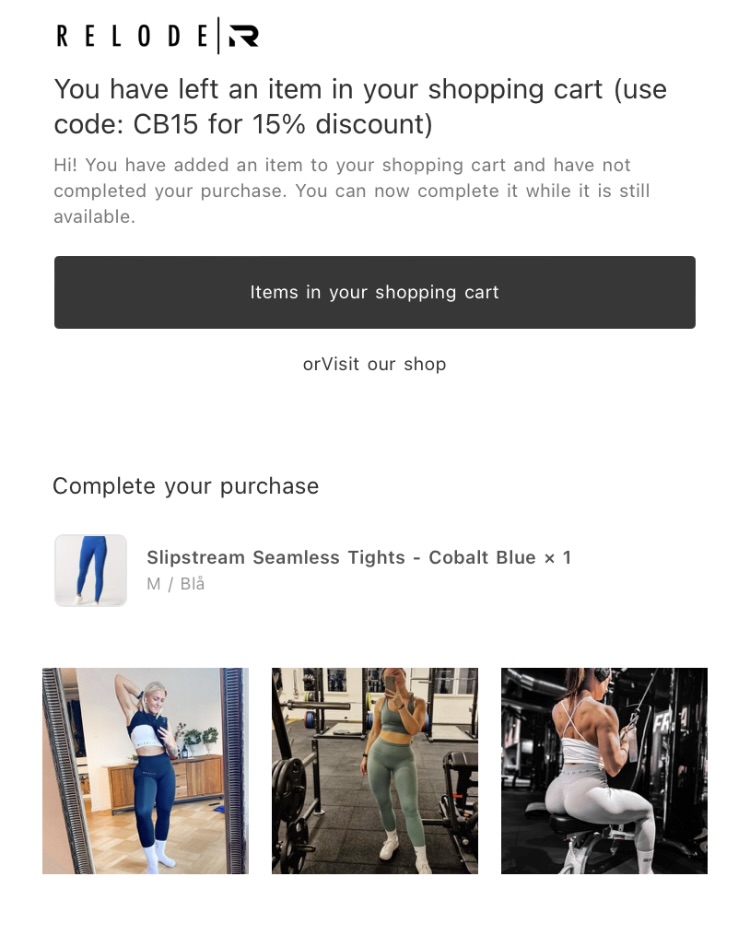
Because shoppers naturally trust content created by their peers over branded content, it can be hugely beneficial for them to see these images.
With Flowbox you can connect all of your social media channels a source so you can make the most of your brand’s user-generated content. Here’s a list of platforms that you can connect to Flowbox:
Flowbox’s sophisticated Publish tool allows for easy organisation, tagging, and distribution of UGC and brand content across multiple channels. This ensures consistent brand presence while maintaining the authentic voice that audiences crave.

The tool’s interface allows users to create, customise, schedule, and publish content directly to their social media accounts. This greatly reduces the time spent by social media managers on planning and shooting content to post manually on a variety of platforms. It can all be done within the Flowbox platform.
MELLER has successfully made UGC a core part of their brand identity. They enhanced their ads with two key strategies: integrating UGC and making their products directly shoppable from the ads.
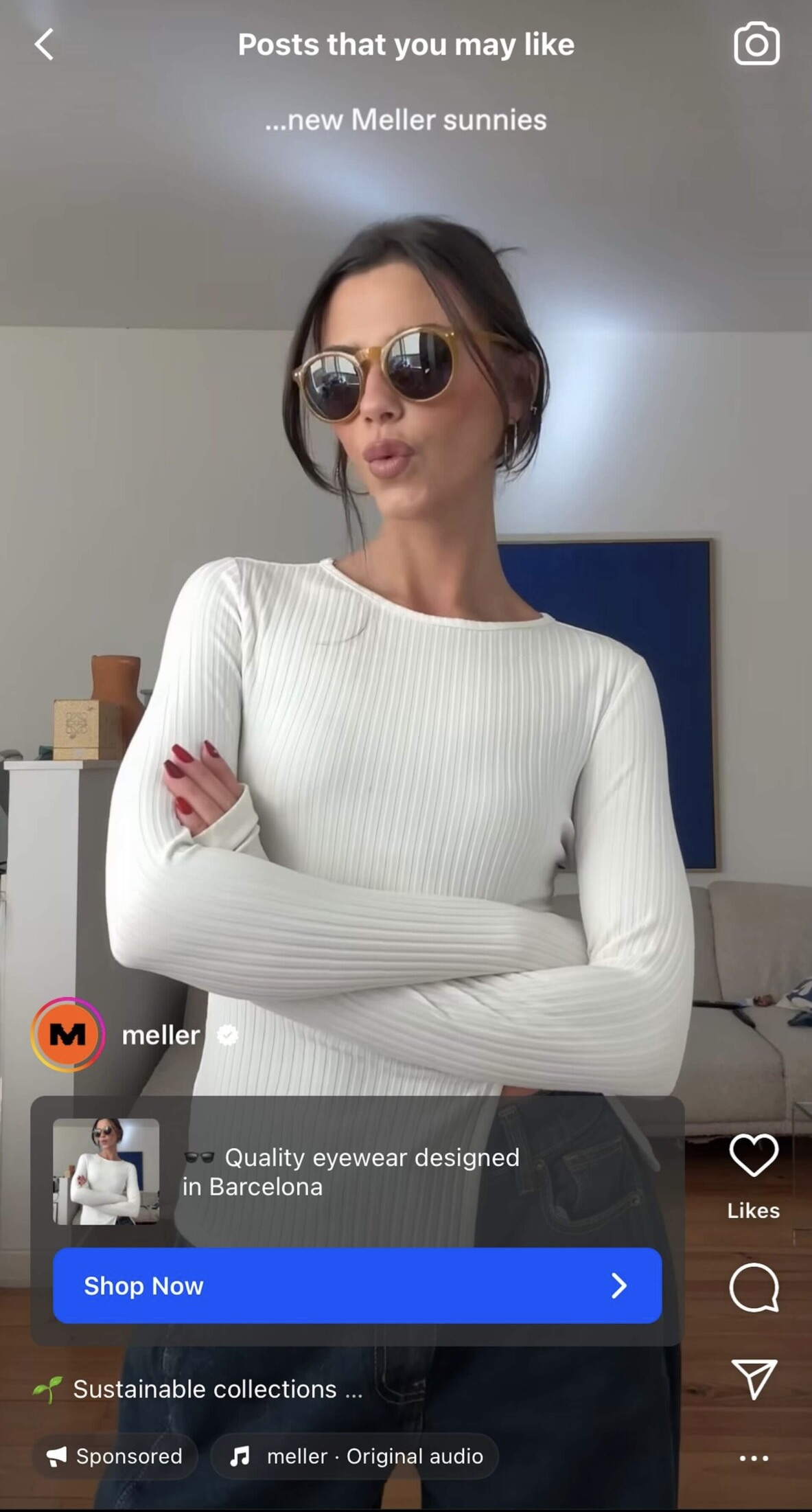
Consumers often perceive ads as unreliable due to the lack of authenticity in the content, whereas an ad featuring UGC is a very authentic form of social proof. Click to see even more shoppable content examples and how you can integrate them into your User-Generated Content Marketing strategy.
A well-defined user-generated content strategy begins with setting clear, measurable objectives that align with your overall marketing goals. Whether you’re aiming to boost brand awareness, increase engagement, or drive conversions, having specific targets helps shape your campaign direction and measure success.
Consider both short-term metrics like engagement rates and long-term goals such as building a sustainable community of content creators.
The first crucial step in developing your UGC strategy is defining clear, measurable objectives. Brand awareness is often a primary goal – this means increasing your visibility and reach across social platforms through authentic user content. Many brands also aim to drive higher engagement rates, as UGC typically generates 6.9x higher engagement than brand-created content.
When focusing on generating authentic marketing content, consider how UGC can supplement your existing content calendar and reduce production costs. Exemplified by XXL Nutrition who use UGC as their product images in their website instead of paying for high production images and videos.
Instagram remains the powerhouse for UGC campaigns, particularly for visual-heavy brands. Its features like Stories, Reels, and grid posts offer versatile ways to showcase user content. The platform’s shopping features make it especially valuable for e-commerce brands looking to convert UGC into sales.
TikTok has emerged as the go-to platform for viral UGC campaigns, particularly when targeting younger audiences. The platform’s creative tools and trending challenges provide perfect opportunities for user participation.
YouTube‘s strength lies in its long-form video content and powerful search capabilities. It’s particularly effective for educational content, product demonstrations, and brands looking to build detailed UGC libraries. The platform’s algorithm favours watch time and engagement, making it ideal for tutorials, reviews, and in-depth product showcases that can continue driving traffic long after publication.
Using Flowbox, you can connect all of your social media channels as a source to collect your user-generated content. Check out this collection of articles to see all of our social media integrations!
Choose a branded hashtag that is memorable and relevant to your campaign. While uniqueness can be beneficial, many successful campaigns have used shared or common hashtags effectively. The key is selecting a hashtag that resonates with your audience and campaign goals. Consider creating a dedicated landing page or highlight reel that showcases your guidelines and submission process.

Like with Meller, you should encourage the customer to tag the brand. When encouraging tagged content, make it clear which tags and mentions to use in posts. Specify whether you want users to tag your brand account, use specific branded hashtags, or mention campaign-specific handles. Consider creating a simple tagging guide with examples of properly tagged content.
You can launch a user-generated content campaign simply by posting on social media or adding a section to your social media bio or website. You could also consider launching with a small group of engaged customers or micro-influencers to seed initial content and demonstrate what good submissions look like. Cosmetics brand Hebe have a page on their website dedicated to UGC influencers where these high-quality submissions are showcased.
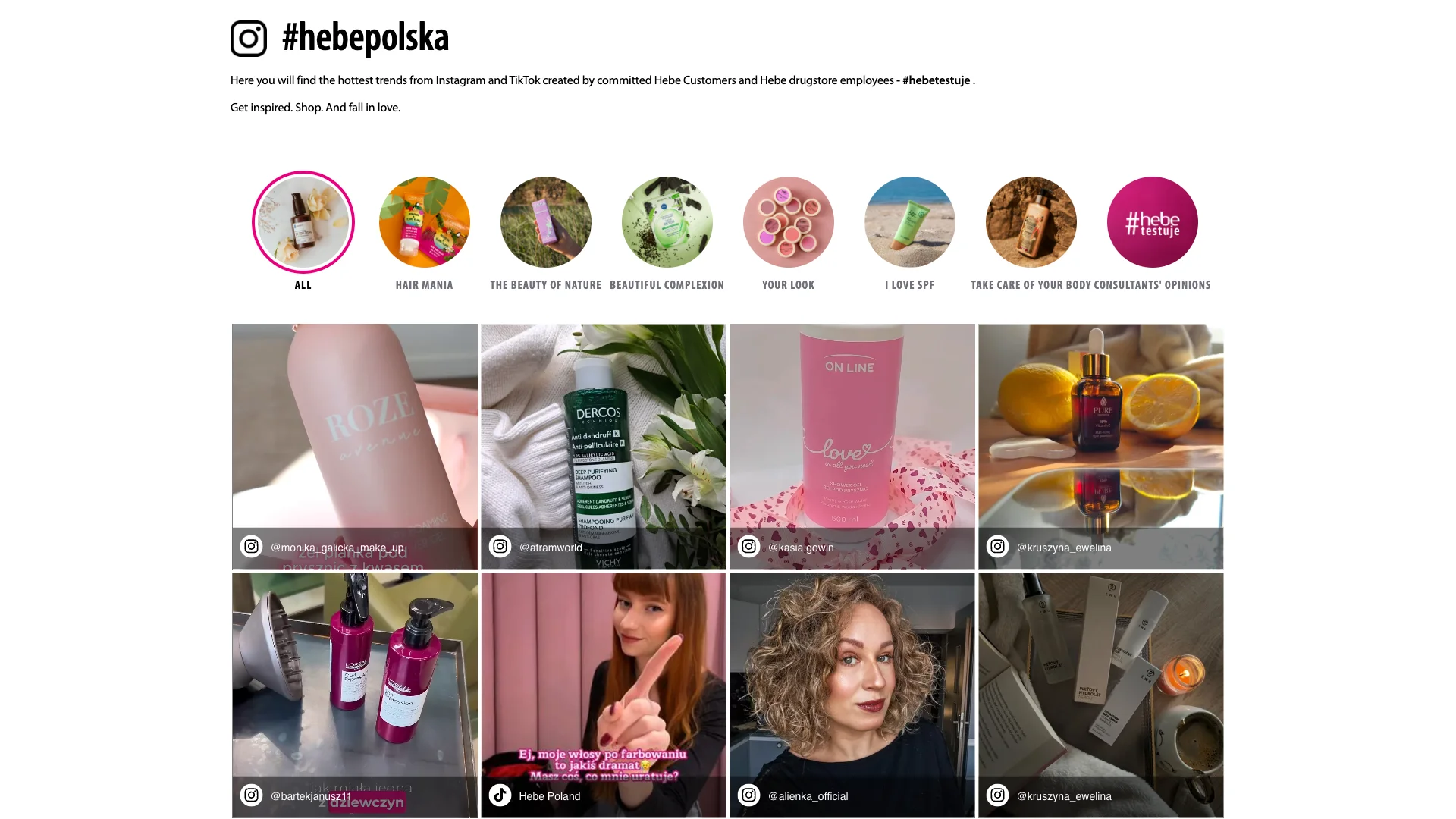
It can also be an option to launch your user-generated content social media strategy with an incentive campaign. For example, take inspiration from brands like Gudrun Sjödén who run gift card contests to incentivise UGC submissions.

This is all about creating a value exchange that benefits both the brand and the customer.
Use a dedicated UGC platform like Flowbox to efficiently track submissions, manage permissions, and handle usage rights. Flowbox offers a comprehensive solution that simplifies content collection, rights management, and content distribution across your marketing channels.
When crediting creators, develop a consistent format that works across all your platforms. Always tag creators in the posts and stories where their content appears. This not only shows respect but encourages others to participate. This is also a further way to incentivise the audience; many creators would prefer a brand shoutout or tag compared to monetary compensation.
Implementing these practices in your UGC strategy ensures that your campaigns remain effective, compliant, and valuable to both your brand and your community. These guidelines help maintain quality standards while fostering authentic engagement and protecting both creator and brand interests.
Following these practices will help you build a sustainable and successful UGC program that benefits all stakeholders.
User-generated content moderation is crucial. It’s exciting to see users posting for your brand on their social channels – but it can get overwhelming when your hashtag is full of content for you to choose from. Especially when there’s some content that you don’t plan on using in your marketing efforts.
That’s why User Generated Content moderation is one of the most important steps of any UGC marketing strategy. It helps you keep your brand’s look and feel intact while you use your target audience to generate brand awareness for you.
An effective way to ensure that you’re only collecting content that you want to use is with tools like Blocked Users and Whitelisted Users. These are 2 Flowbox tools that allow your brand to block spam content while giving a green light to content that you know you’ll be interested in seeing.

From there, managing your content is easy, as you just need to approve the images and videos that you would like to appear on your e-commerce.
Success in UGC relies on building authentic relationships with your community while providing clear pathways for participation. Focus on creating value for your contributors while maintaining content quality and brand alignment.
Here are some ways in which you can activate your community to get them posting about your brand’s products so you can start an effective User-Generated Content Campaign.
It is really important that your customers feel compelled to post content for and about your brand. Design campaigns that motivate customers to share content:
An example of a themed activation is with EVOC Sports who have created a specific section on their website, dedicated to users posting about the Red Bull Rampage, a sponsored event.
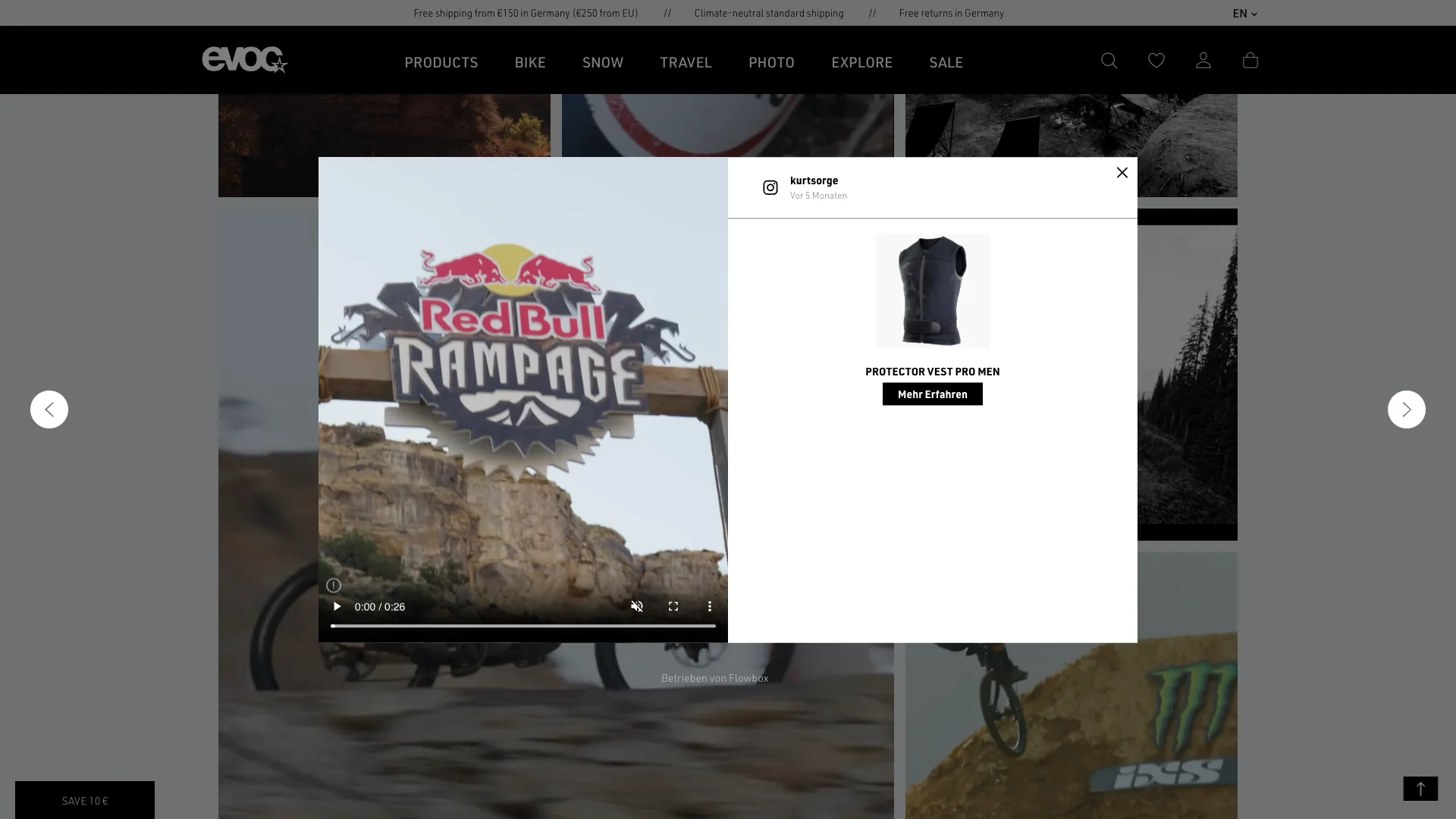
Implement a systematic approach to gathering customer feedback:
Flowbox provide a ratings and reviews system that allows you to fine-tune your sequences by customising waiting periods and effortlessly initiate or pause them as circumstances require.

These sequences serve as your robust workflow engine, seamlessly automating post-purchase email communication and verified buyer badges to enhance your authenticity.
Foster a vibrant community that naturally generates content:
A thriving community is the backbone of sustainable UGC. By featuring user’s content and actively engaging with contributors, brands like Scorett naturally create a positive feedback loop that encourages ongoing participation.

By having a community-first approach, you turn what were originally regular customers into active brand advocates. Acknowledging and crediting content creators through proper tagging and shoutouts to build trust and encourage ongoing participation in your brand’s community
A thriving community is the backbone of sustainable UGC.
User-generated content has become an invaluable asset for businesses looking to build authentic connections with their audience. By leveraging real customer experiences, photos, and reviews, brands can not only significantly boost engagement, but also increase trust, and achieve better marketing results at a much reduced cost.
User-generated content significantly reduces customer acquisition costs across marketing channels. Studies show it’s approximately 16x more expensive to bring a new digital customer to the same level of profitability as a past customer, making UGC an invaluable tool for cost-effective marketing.
UGC plays a crucial role in managing customer expectations and reducing return rates, particularly important since 34% of returns are due to issues with colour, fit, or size.
Beyond immediate sales impact, UGC contributes to sustainable marketing success through:
Flowbox UGC Platform transforms your content strategy by streamlining and automating your workflow through three powerful, time-saving features that will transform how your team handles user generated content:
Instead of manually searching for UGC, Flowbox allows you to collect content from different sources: directly from the user –Media Uploader button– or by connecting a social media platform as a source -Instagram, TikTok, YouTube, Facebook, Pinterest- that you can later Publish on your social media channels or embed on your website.
In addition, the Dynamic Tag Flow helps you distribute content automatically by assigning tags to the content. This feature would help you create seasonal campaigns, filters, or category flows to showcase different topics within your content.
Flowbox’s AI product recognition automatically allows you to tag your post with suggested matching products from your Primary catalog, without having to manually search for them using product ID or name.
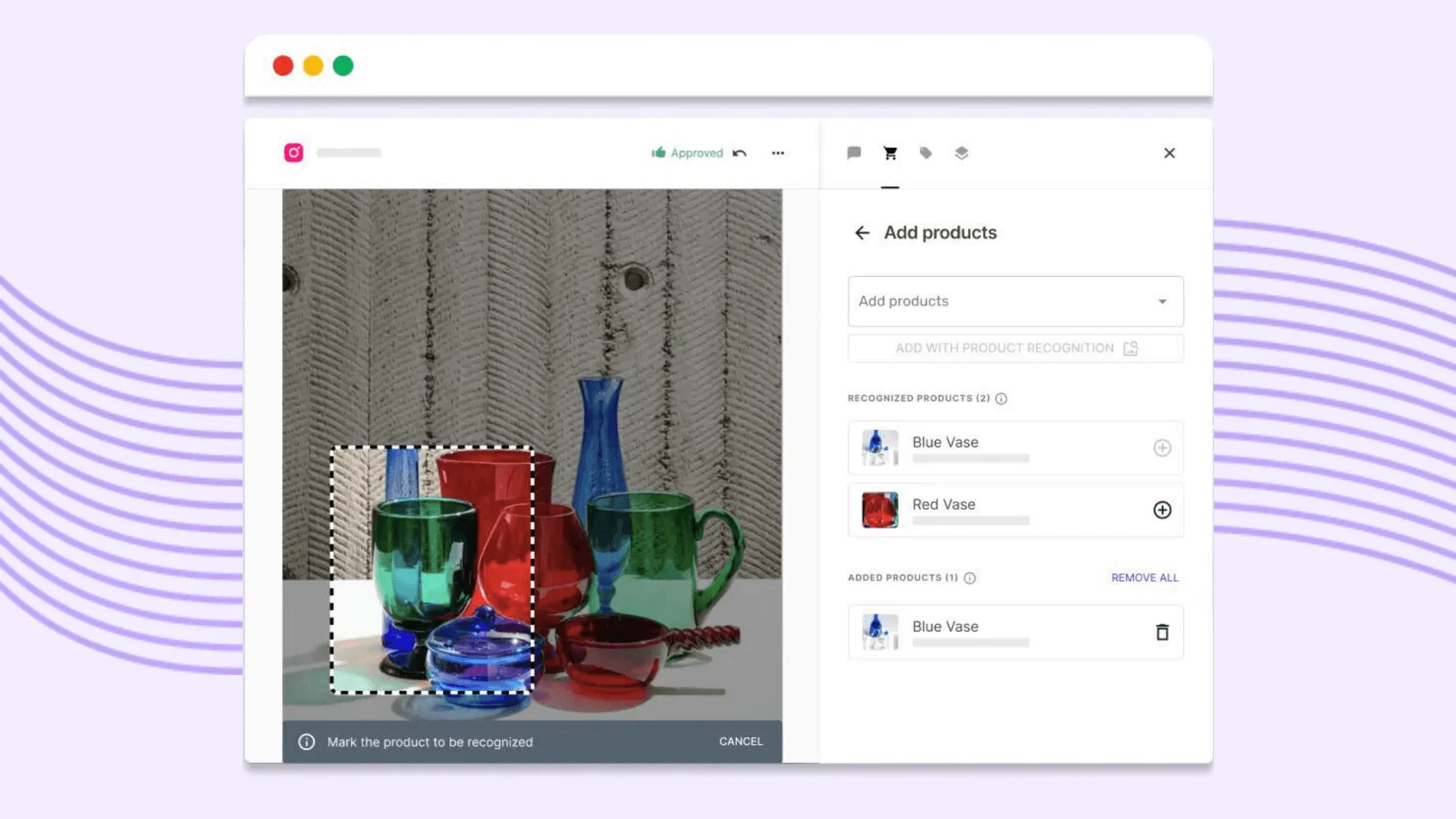
We understand there are a lot of responsibilities around rights requests, that’s why we ensure easy management of your pending requests and help you automatically moderate posts once their rights have been granted with the Right Requests features.

More information on user-generated content permissions can be found here.
With Flowbox’s direct platform integrations, publish curated UGC across all your channels instantly. Flowbox offers the Publish feature, an integrated social media scheduling tool that allows users to create, customise, schedule, and publish content directly to their social media accounts. This collection shows you exactly how to schedule and publish posts across all social media channels.
Track UGC performance across all channels with comprehensive analytics features, helping you make data-driven decisions about your content strategy.
With our Google Analytics 4 integration, you can send analytics events directly from your Flows, enabling you to monitor user interactions, track conversion paths, and measure the impact of your UGC campaigns alongside your other marketing metrics in a single, unified dashboard.

The Posts section in Analytics offers valuable insights into the performance of individual content pieces amongst your clientele. By monitoring various core metrics brands can develop a comprehensive understanding of the content that resonates most with their audience. This information aids in identifying high-performing content, empowering brands to replicate its success in upcoming campaigns.

Find out more about Flowbox’s advanced website analytics and how you can harness data-driven marketing.
If you’re not using a User Generated Content platform or aren’t happy with the platform you’re currently using, request a demo from Flowbox today and experience the benefits of Europe’s leading UGC platform.
User-generated content represents a shift in marketing effectiveness, delivering measurable results across key performance indicators.
The statistical evidence is compelling: UGC consistently generates higher engagement rates, significantly reduces customer acquisition costs, and delivers superior conversion metrics compared to traditional marketing approaches.
The authentic nature of this content creates trust that resonates with potential customers, making it an essential component of modern marketing strategies.
By implementing a comprehensive UGC strategy utilising the frameworks and methodologies outlined in this guide, organisations can effectively harness their community’s collective voice to drive sustainable growth.
If you’re not using a User Generated Content platform or aren’t happy with the platform you’re currently using, request a demo from Flowbox today and experience the benefits of Europe’s leading UGC platform.